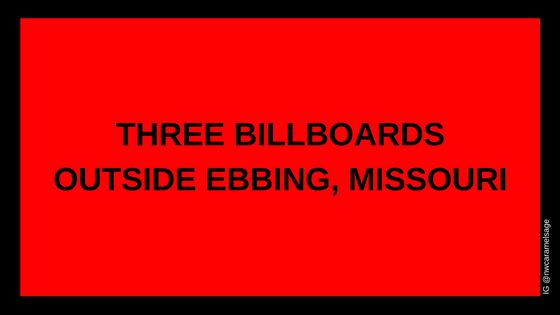Martin McDonagh wrote and directed this film. Because I’d scanned a Fall 2017 article about McDormand’s career in Entertainment Weekly that mentioned its title, that the cast included Frances McDormand and Sam Rockwell was all I knew about this movie beforehand. And since delighting in Sam Rockwell’s performance in 1996’s kooky and unpredictable Box of Moonlight, it is safe for me to declare that his presence in a film is a signal that the viewer is not going to see a formulaic movie. Is she married? What does he do to stay fit? I could not tell you anything about the personal lives of Frances McDormand or Sam Rockwell, and that is perfectly fine by me. That the film, McDormand, Rockwell and McDonagh won Golden Globe awards for Best Drama, Best Actress in a Drama, Best Supporting Actor and Best Screenplay respectively is the positive sort of coverage that really matters.
As the film opens, the big engine in Mildred Hayes’s decades-old station wagon is loud as she slows the vehicle on quiet road, stops and takes in the three titular billboards. All three structures are in disrepair and peeling. As Mildred makes her way into the ad agency in the middle of her town, it is not immediately clear what year it is. She is not gentle as she clarifies words that might be off-limits and then pays for the first month of a one-year lease on the billboards with a folded stack of cash to Red Welby, who runs the agency. Red is clearly roused from his usual routine, but recovers quickly and volleys with wordplay of his own to her. “Are you Angela Hayes’s mother?” Red asks, conclusively. By the time she leaves the agency we know Mildred’s name but we don’t know who she is.
As it turns out, Mildred’s daughter Angela was raped and murdered within walking distance of her home, and the case is unsolved and has gone cold seven months later. The billboards Mildred has leased openly challenge the head of the town’s police force, Chief Bill Willoughby, portrayed by Woody Harrelson. Angela’s murder happened within the geographic patrol of Officer Jason Dixon (Rockwell), but when on the clock, Officer Dixon is far too busy to work on the investigation; he’s nursing hangovers and reading comic books when not hiding behind his badge to commit acts of brutality and to make sketchy arrests. In his off hours, Officer Dixon seems miserable when he’s shown getting drunk and bullying the citizens of Ebbing–including Peter Dinklage’s character James–before staggering home to his emotionally smothering mother. His track record as a law enforcement agent who abuses his authority, particularly with African-Americans is an open secret the whole town seems to be in on. To tell you too much more about the film’s plot would rob you of your own discovery of its distinctive story line. Fox Searchlight Pictures describes the film as “darkly comedic.” You have no idea. Excellent performances and droll deliveries of lines by the cast mean no one performer steals the show, but instead, each scene seems stronger than the last.
A great deal has been written about the problematic way the racial issues are handled in this film. The characters use racial epithets and insensitive language to describe people, and very little is made of the fact that Mildred’s friend Denise (played by Amanda Warren) is jailed by Dixon, solely in retaliation for Mildred’s actions. This is a clever bit of storytelling, though: on any given day how many poor and middle class people sit in jail without protests–or billboards–demanding justice? Ebbing, Missouri’s police force is definitely run like an Old Boys Club and no one with power or privilege seems to question the way the force operates. There are several instances where the townsfolk disapprove of Dixon’s conduct, but no one seems to formally challenge him. Further, though many there are vocalizations and small gestures here and there the occurrences point to a need for larger systemic changes.
While the setting is a bustling small town in a beautiful valley in the Ozarks, the events depicted could have been in any small North American town. Like any group, Ebbing’s citizens are supportive and care deeply when disaster strikes. Three Billboards over Ebbing, Missouri is special as a study of survivors of violence. The film captures the nuances of violence that are an intrinsic part of American culture. We live with violence: from casual acts, to those that garner headlines: murder, rape, torture, assault, arson, domestic violence, suicide, bullying, racial epithets, hostility, gestures, parental disrespect and even saying things to hurt others because we are angry or frustrated that we later come to regret. Also, Three Billboards reminds us of those unsettling cautionary tales of the worst sort of devastation a mind can imagine, but it also reminds us that there exists in all of us a duality that makes it possible to nurture or terrorize our fellow humans, at times even in the same breath.
Lastly, if you are unaware of how violence might be an undercurrent in your life, first think of the most offensive word you can, then fill in the blank in the next sentence. If I had ever used this word at the family dinner table, my parents would have ____________me. Odds are, the blank is filled with an angry or violent response.

